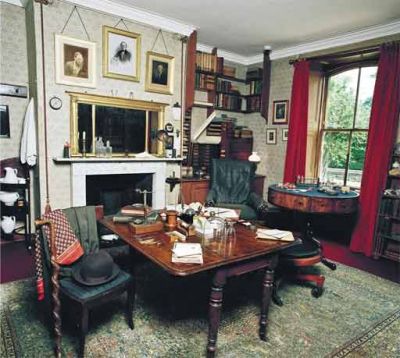When completed in Dubai, this “dynamic building” designed by David Fisher will be in constant motion, always changing its shape, and also generate its own electric energy. You can reserve your apartment today, or wait for similar buildings to get erected in Moscow and New York. The whole concept feels a bit Las Vegas-esque. But who knows, maybe this is the wave of the future. To see what I’m talking about, watch the video below and get more info here.
Fourth of July Factoid
Without Thomas Jefferson and John Adams, Americans wouldn’t have the Declaration of Independence. Rather strangely, both men died on the same day, exactly fifty years after the signing of the Declaration — July 4, 1826.
Stephen Colbert Reads Joyce’s Ulysses
Every June 16 is Bloomsday, which commemorates Jame’s Joyce’s Ulysses (get free audio here). In Dublin and around the world, celebrations usually include a reading of Joyce’s classic. This year, in New York City, one high-profile event featured Stephen Colbert reading the part of Leopold Bloom, the character around which the sprawling novel turns. You can listen to Colbert read here and here. Enjoy, and I will catch you back here after the holiday weekend.
Will Google Kill Science?
Not an obvious conclusion, I’ll agree. However, Chris Anderson, editor of Wired, presents the argument like this: as all sorts of data accumulate into a vast ocean of petabytes, our ability to synthesize it all into elegant theories and laws will disappear. The story is the cover of this month’s issue of Wired but I came across it in a newsletter from The Edge, a group of thinkers trying to promote a “third culture” of online intellectual thought.
Anderson’s argument isn’t really that the scientific method will disappear, but rather that correlation will become as good as it gets in terms of analyzing real-world data. Everything will be too messy, noisy and changing too quickly for proper hypotheses and theorems. As Anderson puts it, it will be “the end of theory.”
The nice thing about reading this on Edge is that the newsletter comes with several critical responses included from “The Reality Club,” which includes thinkers like George Dyson, Kevin Kelly and Stuart Brand. But I say that as the consumers and producers of most of these masses of data, the vote should lie with you, reader: does Google’s brute force approach to data hording spell the end scientific elegance?
Seymour Hersh Reveals Covert Operations In Iran
A quick fyi: Pulitzer Prize-winning journalist Seymour Hersch has a new piece in The New Yorker detailing “a major escalation of covert operations against Iran.” The plans drafted by the Bush administration and funded by Congress brings the US another step closer to a military strike against Iran’s nuclear program, and such a strike becomes all the more likely, Hirsch believes, if Obama wins the November election. (Why? Because Obama favors having direct talks rather than using preemptive force.) You can find an accompanying audio interview with Hersch here. He also appeared yesterday on NPR’s Fresh Air and elaborated on all of this. You can listen here: Stream — iTunes — Feed.
Download 250 Free Online Courses here
Looking Inside Darwin’s Room (and Also Where Virginia Woolf, Lord Byron, & Kipling Did Their Thing)
Darwinmania (as The New York Times dubbed it) is about to begin. During the next year, we will celebrate Darwin’s 200th birthday and the 150th anniversary of the Origin of Species (download zip audio here) and the discovery of natural selection. It’s pretty much a given that the minutiae of Darwin’s life will get thoroughly reexamined. So I figured why not get ahead of the curve and give you this — Darwin’s writing room. It’s provided courtesy of the Guardian Book Section, which lets you take a peek at the writings rooms of Virginia Woolf, Lord Byron, Rudyard Kipling, Martin Amis and many other important writers. (You can also visit our piece from last year for more room photos.)
Find Any Song Online and Share. Now.
Tinysong.com offers a service that’s rather impressive. You go to their homepage, search for a song, and then you can listen to it online and share it with a friend (via a specially created url). Just how it all works (copyright included), and just how deep the collection actually goes, I am not totally sure. But, the various tests that I threw at it suggest that there’s a fair amount of depth there.


